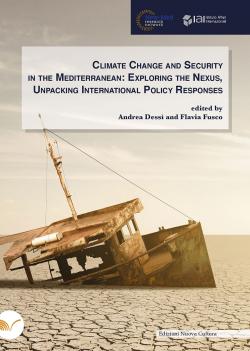Climate Change and Security in the Mediterranean: Exploring the Nexus, Unpacking International Policy Responses
Questo volume esamina la relazione multidimensionale tra cambiamento climatico e sicurezza negli stati e nelle società del bacino del Mediterraneo, sottolineando le principali sfide sociali, politiche ed economiche dell’attuale emergenza climatica e delineando possibili vie di cooperazione per mitigarne gli effetti più negativi. Parte di un più ampio programma di ricerca e impegno sul clima e l’ambiente intrapreso dal New-Med Research Network dal 2020, i singoli capitoli, scritti da eminenti scienziati, accademici e ricercatori, affrontano diverse dimensioni del nesso tra cambiamento climatico e sicurezza nel Mediterraneo, valutandone le implicazioni sulla resilienza statale e sociale, il futuro degli ecosistemi viventi e la stabilità dei contratti sociali, nonché l’urgente necessità di rafforzare un’autentica collaborazione intramediterranea per far fronte all’emergenza climatica e promuovere un’equa condivisione dei rischi e degli oneri associati con la transizione verso l’energia “verde”.
-
Dati bibliografici
Roma, Nuova Cultura, maggio 2022, 146 p. : ill. -
Numero
9 -
ISBN/ISSN/DOI:
978-88-3365-458-4
Contributors, p. 7-9
List of abbreviations, p. 11-12
Foreword, by Lorenzo Kamel, p. 13-14
Introduction: Framing the Climate Emergency in the Mediterranean, by Andrea Dessì and Flavia Fusco, p. 15-34
The Mediterranean hotspot
Division of the volume
References
1. Climate Security in the Mediterranean: What Prospects for Regional Cooperation?, by Niklas Bremberg, p. 35-58
1.1 International cooperation on climate security: An overview
1.2 Climate-related security risks in the Mediterranean region
1.3 Recent regional climate actions in the Mediterranean
1.4 Prospects for regional cooperation on climate security
References
2. The Mediterranean as a Climate Change Hotspot: Implications for State and Societal Resilience, by Wolfgang Cramer and Joël Guiot, p. 59-79
2.1 Climate-related drivers of risk
2.2 Non-climatic drivers of risk
2.3 Risks for water resources and food supply
2.4 Risks for marine and terrestrial ecosystems
2.5 Risks for human livelihoods
2.6 Increasing economic resilience through mitigation and adaptation
2.7 The Mediterranean potential for sustainability transformation
2.8 Equity, climate justice and human rights
References
3. Drought, Desertification and Displacement: Re-Politicising the Climate-Conflict Nexus in the Sahel, by Luca Raineri, p. 81-110
3.1 The Sahel, a key test for the climate-conflict nexus hypothesis
3.2 Exploring the nexus across time
3.3 Droughts, famines and rebellions
3.4 Desertification, regreening and competition for land use
3.5 Re-politicising the climate-conflict nexus
3.6 Recommendations
References
4. Renewable Energy in the Mediterranean: Pathways for Multilateral Cooperation, by Silvia Pariente-David and Philippe Drobinski, p. 111-146
4.1 The policy context
4.2 The Mediterranean wealth: Plentiful carbonless energy resources
4.3 Mediterranean energy market integration
4.4 Pathways for multilateral cooperation
References




